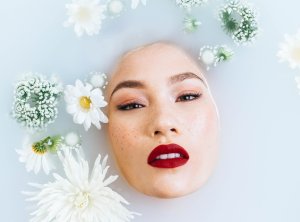 Cleansing your face twice a day, in the morning and in the evening, is an indispensable part of any skincare routine. Of course, it is important to pick the right facial cleanser that meets your skin’s individual needs and won’t strip it of moisture and natural protection. Let’s figure out how to choose the right face wash for your skin type.
Cleansing your face twice a day, in the morning and in the evening, is an indispensable part of any skincare routine. Of course, it is important to pick the right facial cleanser that meets your skin’s individual needs and won’t strip it of moisture and natural protection. Let’s figure out how to choose the right face wash for your skin type.
The type of skin depends mainly on the activity of its sebaceous glands: the less sebum (skin oil) they produce, the drier the skin. If the skin produces too much sebum, it becomes oily. There are several skin type classifications; according to the most common one, there are five skin types: normal, dry, oily, combination, and problem skin (although problem skin is sometimes seen as a subtype of oily/combination skin). Some beauticians also claim that mature (ageing) skin and sensitive skin are also distinct skin types.
To choose the right face wash for your skin type, you need to know your skin type (obviously). There’s a simple test you can do at home. First, wash your face with your regular cleanser and don’t apply any products afterwards, not even moisturiser. Then wait for half an hour or so and thoroughly blot your face with a paper tissue. Leave it on your face for about 2 minutes.
Now look at the tissue. If there are greasy stains all over the tissue, you have oily skin. If the stains correspond to the T-zone (forehead and nose), you have combination skin. If there are no stains at all, you have dry skin. Finally, if there are barely visible traces of skin oil on the tissue, but no large stains, you have normal skin.
And how to figure out whether you have problem skin? In this case, the name speaks for itself: if you have blackheads, pimples, flaky patches, spider veins, inflammations, and other imperfections, then your skin is problem. Please note that problem skin can produce different amounts of sebum, although it is oily more often than dry.
So, you’ve figured out your skin type, what’s next? To understand which cleanser is best for your skin, you should make a list of problems you want it to solve and tasks you want it to perform in your daily skincare routine. First and foremost, a good face wash must remove all impurities from your skin without making it feel dry and tight. Besides, facial cleansing products can help to restore the natural hydro-lipid balance of the skin, control sebum production, relieve irritated, itchy and flaky skin, combat inflammation, etc.
Choosing a Face Wash for Dry Skin
Dry skin needs a very light and gentle face wash, which, in addition to cleansing, will provide intensive nourishment and hydration. If you have dry skin, opt for foaming cleansers or light emulsions that don’t strip the skin of moisture and contain nutrients and moisturising agents, such as hyaluronic acid. Make sure that the cleanser has a low (acidic) pH and doesn’t contain sulphates (for example, sodium lauryl sulphate or sodium laureth sulphate) or other harsh sufractants.
Choosing a Face Wash for Normal Skin
Normal skin doesn’t have any serious issues, so you can use almost any type of facial cleanser, from mousse to gel to lotion. However, it is very important that you find the right balance and buy a product that will neither strip your skin of moisture nor leave it feeling sticky. And please, don’t think that washing your face with soap is okay just because your have normal skin.
Choosing a Face Wash for Oily Skin
Cleansing gels are considered the best option for oily and oiliness-prone skin. They usually contain little to no oils, have a light texture, lather well, and are easy to rinse off. Many face washes for oily skin contain anti-acne ingredients, such a zinc or salicylic acid. They help to control sebum production, unclog pores, and prevent blackheads and pimples. Such products can be drying to your skin, so you should use them carefully; when oily skin gets dehydrated, it starts to produce more sebum to compensate and ends up even oilier than before. So don’t overcleanse your face and always moisturise after washing it.
Choosing a Face Wash for Combination Skin
Choosing the right face wash for combination skin is not an easy task because this skin type has dry patches and oily patches, meaning that your face wash must effectively cleanse and balance oily patches without making dry patches even drier. You should opt for lightweight, low-pH products (for example, foaming cleansers and mousses), which contain ingredients that are good both for oily and for dry skin, such as hyaluronic acid, panthenol, allantoin, bisabolol, kelp extract, and hydrolysed proteins.
Choosing a Face Wash for Problem Skin
It’s hard to give clear recommendations in such a case, because the choice will depend on your skin’s peculiar problems and needs. For example, if your main problem is acne, your face wash should contain ingredients that target it, for example, salicylic acid, zinc, aloe vera leaf juice, panthenol, and absorbents (such as charcoal or cosmetic clay). If your skin is itchy and sensitive, you need a face wash with soothing ingredients, such as aloe vera leaf gel, chamomile extract, allantoin, bisabolol, etc.
Regardless of your skin type, you should make sure that your face wash is high-quality and safe for your health, meaning that it contains no mineral oil, aggressive surfactants and preservatives, synthetic fragrance and dyes, or other potential irritants. To be on the safe side, choose natural and organic products with plant-based ingredients, which are both safe and effective. You can find a wide selection of natural face washes in our online shop Organic Store.
